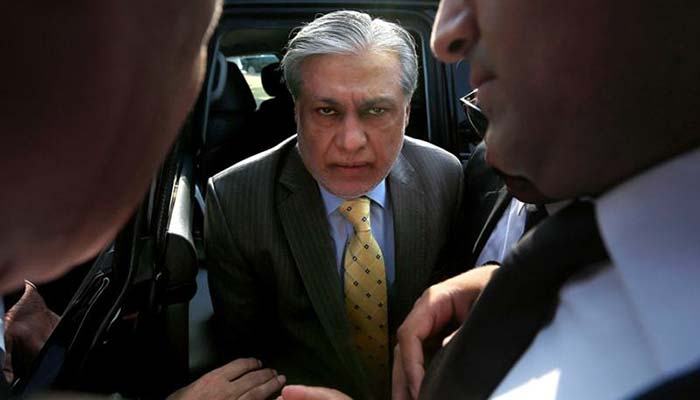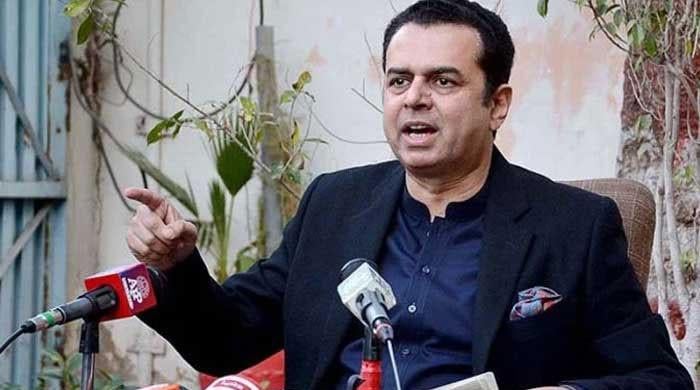Extraditing Ishaq Dar to Pakistan almost impossible no matter the MoU
Leading lawyers say Ishaq Dar could not be extradited anytime in the next few years even if Pakistan triggers process right now
July 09, 2019

LONDON: Leading lawyers have opined while Pakistan and the United Kingdom have signed a Memorandum of Understanding (MoU) for the extradition of former finance minister Ishaq Dar for trial to Pakistan but the belligerent statement by Foreign Secretary Jeremy Hunt and the politicisation of the MoU by the Pakistani government has made Dar’s extradition almost impossible if the case ever goes before the UK judges.
Speaking with this correspondent, several leading lawyers familiar with the extradition laws agreed that Ishaq Dar could not be extradited to Pakistan anytime in the next few years even if the extradition process is triggered right now. Barrister Faras Baloch said that even if the extradition request is triggered through an arrest warrant by the Home Office, Ishaq Dar would likely appeal this on the basis that the MoU was insufficient guarantee of fair trial, his safety and the conditions of Pakistani prisons.
"The appeal process could take years to resolve and end up in the European Court of Human Rights. Pakistan still has the death penalty and appalling conditions in prisons and so the UK would be unlikely to grant extradition requests," he said adding that concerns regarding the human rights situation generally of the country will be a major problem.
Baloch added, “Ishaq Dar will probably rely on Article 3 of the ECHR - prohibition on torture or inhuman treatment and Article 6 the right to a fair trial. He might argue that if he is extradited these rights would be violated.”
Barrister Zarif Khan, who has acted as a defence lawyer in extradition cases, said each case depends upon its own facts but apparently several key questions about the MoU and the possible defence of Dar remain making the whole case complex.
Khan said, “The first stage in any process is that Pakistan government must make a request for extradition on evidence which will be first tested to an extent here as Dar’s legal team will have to argue that they are so politically motivated but at the same time the government of Pak will have to satisfy that they are not and/or there is sufficient evidence to charge.”
Barrister Khan said he assumed that Dar will challenge the legality and purpose of the extradition through the UK courts that it’s politically motivated, that he will not get a fair trial, that he will be mistreated etc. “It depends how the MoU is drafted & whether any holes can be picked in it."
He gave examples of Abu Qatada’s case in which the former al-Qaeda associate was extradited to Jordan through an MoU on July 7, 2013 after the UK and Jordanian governments agreed and ratified a treaty satisfying the need for clarification that evidence potentially gained through torture would not be used against him in his forthcoming trial.
Barrister Ayesha Qureshi, of A P Berkeley, said that Extradition Act 2003’s section 194 deals with special extradition arrangements. This section applies if the Secretary of State believes that arrangements have been made between the United Kingdom and another territory for the extradition of a person to the territory. She gave example of the MoU signed between Rwanda and the UK for the extradition of five men involved in alleged genocide.
Section 194 is known as an ad hoc arrangement, which means that extradition can be agreed outside a formal treaty as long as certain conditions are met and the Home Office is satisfied. For Pakistan, the major test will be to satisfy the British government, first, and then the British courts and that’s an uphill task in itself.
Ayesha Qureshi said that English courts dismissed the appeal of the government of Rwanda in the high profile extradition proceedings against five alleged genocidaires in the case of Rwanda v Nteziryayo and others.
The judgment of the Divisional Court affirmed the decision of District Judge Emma Arbuthnot on December 22, 2015 to discharge the extradition requests on two grounds: double jeopardy – one of the requested persons had been tried in a domestic ‘Gacaca’ court —and Article 6 of the European Convention on Human Rights. The judge accepted the evidence of the requested persons that there was a real risk they might suffer a flagrant breach of their rights to a fair trial if extradited to Rwanda and that will apply in the case of Ishaq Dar if the government ever goes to the English courts.
Pakistani government has claimed that it has signed an MoU with the UK government providing legal basis in the absence of an extradition treaty. The document, signed by Graeme Biggar, the new Justice and Accountability focal person for Pakistan and Shahzad Akbar stated that the MoU means the “surrender to the government of Pakistan of Ishaq Dar for the purpose of prosecution there for one or more offences and for the purpose of serving a sentence of imprisonment”.
The MoU states that it provides for “more effective cooperation in combating crime”. It goes on that the MoU is “mindful of the guarantee under the respective legal system which produces an accused person right to a fair trial including the right to adjudication by an impartial tribunal established pursuant to law”.
Two weeks ago, Foreign Secretary Jeremy Hunt said the United Kingdom would not sign any extradition treaty with Pakistan that could be used for politically motivated cases.
Speaking at a joint press conference here with Foreign Minister Shah Mahmood Qureshi at the Foreign and Commonwealth Office (FCO), Hunt confirmed the two had discussed the issue of an extradition treaty between the UK and Pakistan. Hunt said, “Let me say it straightforward. No extradition treaty the UK will ever sign allowing for the politically motivated extradition."
Shahzad Akbar has said that Jeremy Hunt’s statement has nothing to do with the MoU signed between the two countries. In a statement to The News and Geo, the Home Office said, “As a matter of long-standing policy and practice, the UK will neither confirm nor deny that an extradition request has been made or received until such time as an arrest has been made in relation to that request."
On condition of anonymity, a government source shared that Pakistani government has so far sent at least seven requests in over a year for extradition of Ishaq Dar but on each occasion, the Pakistani government was asked to provide more details.
Even after the MoU was signed, Pakistan received a letter from the Home Office seeking answers of more questions, said a source familiar with the case. It’s understood that Ishaq Dar has not been contacted by the Home Office in any form related to the extradition requests made for him, he has not been asked to cooperate with the Home Office or any effort related to requests from the PTI government.
"We have heard nothing from the government in this regard and the only time we have heard about the MoU and extradition is through media reports. Our client will robustly defend himself when needed," said a member of Dar’s legal team.









